Originally published January 30, 2014 at 5:31 PM | Page modified January 31, 2014 at 4:16 PM
Seattle vs. Denver: An “unreal chess match”
It’s Peyton Manning and the Broncos’ high-scoring offense against the Seahawks’ No. 1 defense in the Super Bowl on Sunday.
Seattle Times staff reporter
Bettina Hansen / The Seattle Times
Seahawks cornerback Richard Sherman (25) and his defensive teammates will face their biggest challenge of the season on Sunday.
Jack Dempsey / AP
Denver quarterback Peyton Manning is great at disguising the play he is going to run while operating out of a no-huddle offense.
When offense meets defense
The Seattle-Denver Super Bowl will be the fifth time a defense that allowed the fewest points in the NFL (the Seahawks) meets an offense that scored the most (Broncos). Here are the results of the four previous matchups:
Super Bowl XXV
New York Giants 20, Buffalo 19: A Bills team averaging 26.8 points gained 371 yards and was in control for most of the first half. But Buffalo couldn’t keep the Giants’ offense off the field, and then after driving for what looked to be a game-winning field goal, saw Scott Norwood miss wide right from 47 yards out. Winner: Defense.
Super Bowl XXIV
San Francisco 55, Denver 10: The Broncos had allowed just 14.1 points per game during the season but were no match for Joe Montana and Jerry Rice. Montana threw for five TDs, three to Rice, and a 49ers defense that was third in the NFL shut down John Elway. Winner: Offense.
Super Bowl XIX
San Francisco 38, Miami 16: It’s maybe forgotten how good the 1984 49ers were on defense, having shut out the Bears 23-0 in the NFC title game. That, combined with a No. 2-ranked offense led by Montana, overwhelmed a Miami team that had no running game and a spotty defense around QB Dan Marino. Winner: Defense.
Super Bowl XIII
Pittsburgh 35, Dallas 31: Two well-balanced teams — Pittsburgh was first in defense and fifth in offense and Dallas first in offense and third in defense — predictably played a well-balanced game. Terry Bradshaw’s record four touchdown passes proved the difference. Winner: Defense.
Bob Condotta
![]()
Super Bowl XLVIII won’t only determine the best team in the NFL this season.
It might also help answer one of life’s eternal questions — what happens when an immovable object meets an unstoppable force?
As scientists long ago determined, there cannot be both.
In football terms, then, something has to give when a Denver passing offense that set NFL records for touchdowns (55) and yards (5,571) meets a Seattle defense that became the first since the legendary 1985 Bears to lead the league in fewest points allowed (231), fewest yards allowed (273.6 per game) and takeaways (39).
True, calling Denver’s offense unstoppable might be a bit much — the Broncos have punted once in the postseason.
And maybe you think it’s hyperbole labeling Seattle’s defense as immovable — the Seahawks did allow roughly one touchdown per game this season (20, with three others on returns or turnovers).
OK. But by any measure, the matchup rates as one of the most intriguing in Super Bowl history.
FootballPerspective.com gave it some, well, perspective, when it determined that this game will feature the greatest disparity in the scoring offense of one team (Denver, at 37.9 per game) and the points allowed by the defense of the other (Seattle at 14.4 per game) of any Super Bowl, a difference of 23.5 points.
And it’s not even really close, especially if you throw out the pre-merger days of high-flying AFL teams meeting old-school NFL squads.
Since the 1970 merger, the next greatest disparity between the offense of one and the defense of another came in 1985 when a Dan Marino-led Miami team came in averaging 32.1 points against a 49ers defense allowing 14.2 (a difference of 17.9).
You’ll get no argument from the combatants about the potential for something legendary.
“It’s historically as hard as it gets,’’ Seahawks coach Pete Carroll said of the challenge of stopping the Denver offense. “It can’t get any tougher.’’
A Super Bowl featuring the No. 1 ranked offense (in terms of yards allowed) against the top-ranked defense has happened only one other time since the 1970 NFL merger. That occurred in 2003, and provides a hopeful omen for Seattle fans as Tampa Bay and its top-ranked defense beat Oakland and its top-ranked offense 48-21.
More common are games featuring offenses ranked No. 1 in points per game and a defense ranked No. 1 in fewest points allowed.
This will be the fifth time that has happened, and history provides another hopeful omen for the Seahawks as the team with the stingiest defense has won three of the four previous such matchups.
Those stats would seem to confirm the old saying that defense indeed wins championships.
Another longtime football adage, though, holds that when all things are equal, the offense has the edge.
“Of course,’’ said Seattle offensive coordinator Darrell Bevell. “We know where we are going and the defense most of the time should have to react to what we are doing.’’
Maybe that means there is more than just defense to winning championships. That was the case for the quarterback Joe Montana-led 49ers, a team that also had the best defense in the NFL, when it beat Marino and the Dolphins in the 1985 Super Bowl.
Terry Bradshaw quarterbacked a Steelers team that had the best defense in the NFL to a win over Roger Staubach and the Cowboys, who had the top-ranked offense, in 1979. (The other top defense to beat a No. 1 offense was the 1990 New York Giants, who beat the Bills in the famous Scott Norwood “wide right’’ game.)
Montana is the only quarterback to win games on both ends of the spectrum. He and receiver Jerry Rice led a 49ers team that had the top-ranked offense during the1989 season to a 55-10 win over Denver, which had the top-ranked defense.
So maybe history, as Seattle left tackle Russell Okung said earlier this week, doesn’t mean anything, and all that will matter is the matchup Sunday.
Seahawks coaches and players have insisted they won’t need to change much to have success.
“We’re going to do what we do,’’ said linebacker K.J. Wright.
John Middlekauf, a former NFL scout who is now a radio talk show host in the Bay Area, agrees that the Seahawks don’t usually vary their game plans a lot and likely won’t against the Broncos.
“From a scheme standpoint, Peyton Manning knows what he’s going to get,’’ Middlekauf said. “But maybe Carroll will try to give him some different looks early to try to throw him off.”
Middlekauf says one difference between Manning and some quarterbacks who face Seattle is that Manning won’t be shy about throwing it in the direction of cornerback Richard Sherman.
Teams tested Sherman just 58 times in the regular season and just three times in two playoff games (only once by Drew Brees, who threw 43 passes). One of those three targets turned into as memorable play as there is in Seahawks history when Sherman tipped a pass into the hands of Malcolm Smith for a game-saving interception in the NFC title game.
Middlekauf, though, doesn’t expect Manning to back down from Sherman.
“I don’t think Peyton is going to be scared of Richard Sherman in the sense that if he gets a matchup he likes, if they run a quick out that way, he’s not going to be terrified to go his way,’’ Middlekauf said.
What also makes Denver’s offense tricky is that it operates a no-huddle offense, with Manning calling plays and protections at the line of scrimmage (and yes, throwing in a few “Omahas” along the way). An underrated aspect of Seattle’s defensive success, meanwhile, is its ability to quickly recognize plays, which could be muted by Manning’s at-the-line adjustments.
“The most challenging thing with the no-huddle is you can’t really pick up on the indicators that they do,’’ Wright said. “Usually when a team comes out we can see where they are lined up, certain (receiver) splits. That’ll be the most challenging part that we can’t really pick up on what play is about to come.’’
And maybe, as happened in some of those other offense-defense matchups, the immovable object and the unstoppable force will cancel each other out a bit and it’ll be another matchup that will decide things.
Dallas, for instance, scored 31 points against the top-ranked Steelers defense in 1979 but lost when Bradshaw threw four touchdown passes.
“I’d imagine Seattle will take the same approach it did all year — run the ball and keep Manning off the field as much as they can,’’ Middlekauf said.
That much-less-flashy matchup — a Seattle offense that ranked 17th this year against a Denver defense that ranked 19th — might loom just as critical.
History, though, figures to remember Manning vs. the Legion of Boom.
“You have Peyton Manning, who is probably the greatest offensive mind we have seen as a player — he really is the pseudo offensive coordinator,’’ Middlekauf said. “And then you have Pete Carroll, who I don’t think gets enough credit for how good of a coach he is, and especially as a secondary coach. Remember that’s what he was to begin with. It’s really just an unreal chess match.’’
Bob Condotta: 206-515-5699 or bcondotta@seattletimes.com. On Twitter @bcondotta.







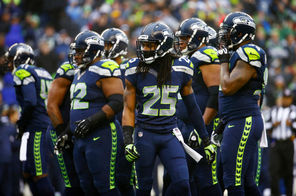
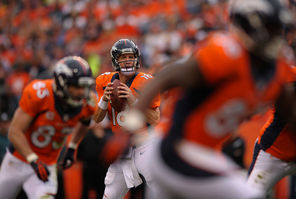
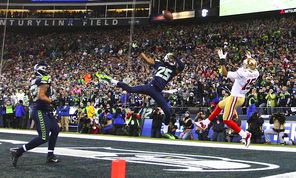
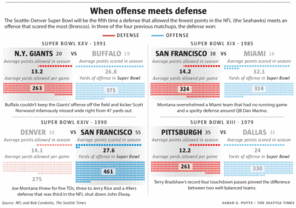

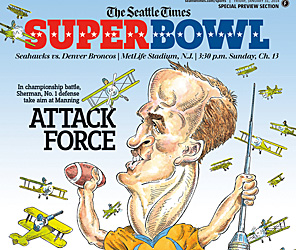 Click to enlarge
Click to enlarge



